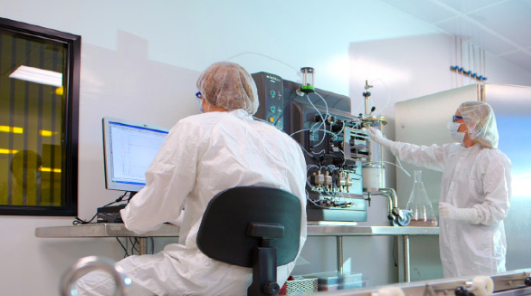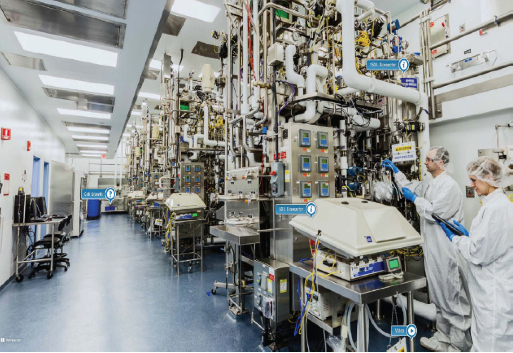Austin, Texas based biotechnology firm XBiotech U.S.A. Inc. has announced interim results from its fast-tracked Phase III study being conducted in the US for its anti-cancer agent Xilonix.
A True Human monoclonal antibody therapy, Xilonix is being evaluated in advanced colorectal cancer patients whose disease is further complicated with cachexia (weakness and wasting of the body due to severe chronic illness).
 XBiotech’s Xilonix product targets and neutralizes a small protein substance produced by the body known as Interleukin-1 alpha (IL-1a), a protein of the interleukin-1 family that in humans is encoded by the IL1A gene produced by white blood cells to stimulate inflammation in tissues, where it causes tissue breakdown, angiogenesis, swelling and pain. IL-1a can also trigger special central nervous system (CNS) pathways in the brain which are interpreted as danger signals.
XBiotech’s Xilonix product targets and neutralizes a small protein substance produced by the body known as Interleukin-1 alpha (IL-1a), a protein of the interleukin-1 family that in humans is encoded by the IL1A gene produced by white blood cells to stimulate inflammation in tissues, where it causes tissue breakdown, angiogenesis, swelling and pain. IL-1a can also trigger special central nervous system (CNS) pathways in the brain which are interpreted as danger signals.
An XBiotech white paper notes that malignant tumors have the ability to induce a chronic and systemic inflammatory environment that gives rise to cachexia. Metastatic disease can in fact be potently active at inducing cachexia, with onset occurring in the presence of remarkably little overall tumor burden. The efficient induction of cachexia can be explained by the fact that during metastasis, hematogenous tumor cells have the opportunity to closely interact with — and activate — leukocytes. Systemic distribution of these activated inflammatory leukocytes are a source of chronic inflammation, and these inflammatory nuclei relay “danger” signals to the central nervous system (CNS) by way of the hypothalamus, mobilizing a “fight-or-flight” response, which includes induction of a hypermetabolic state, de novo synthesis of glucose (gluconeogenesis) and muscle breakdown (as a source of precursors for gluconeogenesis).
An acute “fight-or-flight” response may be crucial to providing enhanced access to energy reserves during an emergency, but chronic activation of this response would be expected to have serious and negative consequences over an extended period of time, notably the excessive loss of muscle tissue associated with ongoing gluconeogenesis. These danger signals create the perception of foreboding that is associated with chronic illness, and also direct metabolism to consume muscle tissue as a source of energy. The result is physical wasting and the dire consequences of this process. In cancer plays an additional role in metastasis through tumor cell interaction with white blood cells in the circulation.
The study’s primary endpoint is overall improvement in survival, comparing survival in Xilonix-treated patients to a control population that have been provided only palliative therapy for cachexia.
A recent interim analysis XBiotech recently conducted surveying the 40 patients enrolled in the study to date found that over half of the patients have succumbed to disease, enabling what the Company says is a preliminary analysis of study endpoints.
At the time of analysis, patients receiving Xilonix had a hazard ratio for risk of death of 0.33 (p=0.11) compared with controls, XBiotch observing that the strong hazard ratio reveals a marked trend for improved survival in the Xilonix-treated group compared to controls.

The company discloses that it has used interim overall survival data in a model to predict statistical significance of the survival benefit over the projected complete course of the study — a model said to indicate that based on the current effect seen with Xilonix, a highly significant result would be obtained upon study completion, well beyond what is necessary for registration.
XBiotech notes that pharmacodynamic measures were also reportedly consistent with intended biological activity of the therapy; and as well, secondary life quality evaluation endpoints were consistent with observed longer survival benefit in Xilonix patients. Especially when considered together, these data are considered to be strong supportive evidence of the drug’s clinical activity.
The unscheduled interim analysis was enabled due to a halt in the study for protocol amendments, which XBiotech says are intended to correct perceived barriers to patient enrollment. The company reports it is currently collaborating with the FDA on revisions to ensure the protocol remains suitable for biological licensing applications. The new protocol is said to permit recruitment of all advanced refractory colorectal cancer patients and will be randomized 2:1 against placebo. XBiotech is expecting patients to be enrolled under the revised protocol as early as October this year.
XBiotech CEO, John Simard observes in a release: “Enrollment challenges in this highly competitive environment for colorectal cancer patients forced us to reevaluate assumptions for the study design. What was unanticipated was that this problem would enable our team to perform an early evaluation of ongoing study results. What we found was dramatic. These survival results, seen in the context of enhanced patient health and well being as a result of therapy, suggests a quantum advance in the management of advanced cancer.”
XBiotech is a leading developer of biological therapies, including the discovery and development of True Human antibodies and proven blockbuster biosimilars. The company’s lead product candidate in two Phase III clinical studies is a novel, breakthrough treatment for advanced cancer. XBiotech has developed the manufacturing technology to enable production of biological drugs with an unprecedented low cost of goods, reduce infrastructure needs, lessen capital requirements and reduce lead times for biological drugs.
XBiotech Inc. was incorporated in 2005 in Vancouver, Canada, and now has wholly owned subsidiaries in Zurich, Frankfurt and Tokyo, and operations headquartered in Austin, Texas.The company operates 46,000 ft2 facilities in Austin, which is home to XBiotech’s worldwide headquarters and housing administrative, R&D, clinical and manufacturing operations. XBiotech USA Inc., XBiotech Japan K.K., XBiotech Swiss AG, and XBiotech Germany GmbH are all 100% owned subsidiaries of the parent company, XBiotech Inc. Canada.
For more information, see:
http://www.xbiotech.com/downloads/XBiotech_Corporate_Brochure_February_2014.pdf
Sources:
XBiotech
Image Credits
XBiotech




